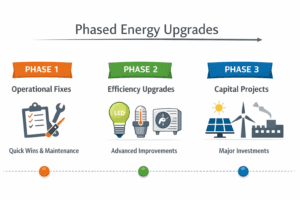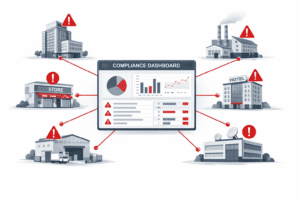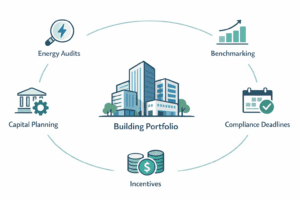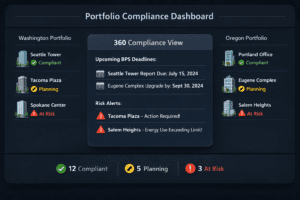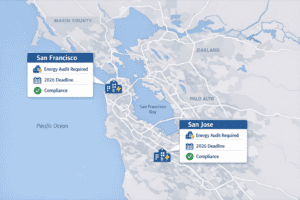I. Introduction
In the vibrant urban landscape of San Francisco, energy efficiency transcends the realm of buzzword to become a foundational element of operational success and ethical responsibility for businesses. The concept of San Francisco Energy Audits specifically in the commercial sector plays a pivotal role in not just reducing operational costs but also in fostering a sustainable business model that aligns with global environmental goals.
This comprehensive exploration into commercial energy audits will highlight their importance, delve into the process, and discuss the multifaceted benefits they offer to businesses within the unique environmental and regulatory context of San Francisco.
II. Understanding Commercial Energy Audits
What is a Commercial Energy Audit?
A Commercial Energy Audit comprehensively assesses how energy is used in business operations, pinpointing inefficiencies and areas where savings can be made. The aim is to identify cost-effective solutions to enhance Energy Efficiency, thereby reducing overall energy consumption without compromising business productivity.
ASHRAE Energy Audit Levels
The ASHRAE Energy Audit Levels outline a structured approach to auditing, which helps businesses understand the depth of analysis conducted:
- Level 1: Walk-Through Analysis – This provides quick insights into potential energy savings and could unravel immediate changes that lead to cost savings.
- Level 2: Energy Survey and Analysis – This detailed survey goes beyond Level 1 by providing a more comprehensive analysis of energy costs, usage, and efficiency.
- Level 3: Detailed Analysis of Capital-Intensive Modifications – The most detailed level, focusing on major investments and long-term energy solutions.
The Audit Process
The auditing process includes several critical steps, beginning with initial data collection (like utility bills and existing equipment specifications), followed by on-site inspections using advanced tools such as infrared cameras to detect energy leaks and inefficiencies. Data analysis leads to a detailed reporting that outlines specific areas for improvement, potential savings, and recommended changes.
III. The San Francisco Context
San Francisco’s commitment to reducing environmental impact makes it a leading city in energy regulation and innovation. The city’s policies mandate regular San Francisco Energy Audits to encourage businesses to adopt more sustainable practices.
Local regulations, such as the San Francisco Existing Commercial Buildings Energy Performance Ordinance, require commercial buildings to undertake regular audits, ensuring they meet specific energy efficiency standards.
IV. Impact of Commercial Energy Audits on Businesses
Cost Savings
Businesses often incur significant costs from outdated and inefficient energy systems. Audits can reveal areas where simple upgrades can lead to substantial reductions in energy consumption—savings that are financially beneficial over time.
Sustainability Enhancements
Through audits, businesses can significantly reduce their carbon footprint, aligning with corporate sustainability objectives and broader environmental goals. This proactive approach not only helps the planet but enhances the company’s reputation in an eco-conscious market.
Enhanced Corporate Image
In today’s market, a strong environmental stance is often as crucial as the quality of products or services offered. Businesses known for their green initiatives often enjoy enhanced customer loyalty, which can translate into increased sales and market share.
V. The Role of Professional Energy Auditors
Professional auditors bring a level of expertise and thoroughness to the process that often surpasses what businesses can achieve on their own. They are trained to use advanced diagnostic tools and to understand the complexities of building systems and energy flows.
Choosing a certified and experienced auditor is crucial. Businesses should look for auditors with credentials from recognized bodies such as the Association of Energy Engineers.
VI. Future of Commercial Energy Audits in San Francisco
The future of energy auditing in San Francisco looks robust, driven by advancements in technology such as IoT for real-time energy monitoring and AI for predictive analysis. These technologies promise to make energy audits more precise and impactful.
Furthermore, as the regulatory environment tightens, the scope and frequency of energy audits are likely to increase, making them an integral part of business operations in the city.
VII. Conclusion

San Francisco commercial energy audits are more than a regulatory requirement; they are a wise business strategy that promotes financial savings, enhances sustainability, and improves corporate reputation. The strategic importance of these audits cannot be overstated in the context of global environmental challenges and the competitive business environment of San Francisco.
VIII. References
– ASHRAE
– San Francisco Department of Environment
IX. Call to Action
If you are a business owner or facilities manager in San Francisco, consider how a commercial energy audit could transform your operations. Not only could it lead to significant cost reductions, but it would also boost your business’s green credentials. Share this post with your network, or contact a professional energy auditor to discuss how you can specifically benefit from this service.
VertPro.com serves as a resourceful platform for property owners and managers seeking to enhance their buildings’ energy efficiency. The site offers a range of services, including Commercial Energy Audits, Benchmark Compliance consultancy, and a Construction Marketplace. At the heart of VertPro® is a suite of SaaS technology-based solutions designed to assist in navigating the complexities of Energy Benchmarking and Energy Audits/RCx Plus, while ensuring adherence to over 60 Energy Benchmarking and Energy Efficiency Laws across the country.
For those looking to improve their property’s energy usage and operational value, VertPro.com provides a diverse array of tools and information. The site aims to facilitate a better understanding of energy efficiency practices and legislation, helping building owners and property managers make informed decisions about their energy strategies while complying with all energy ordinances and laws.




